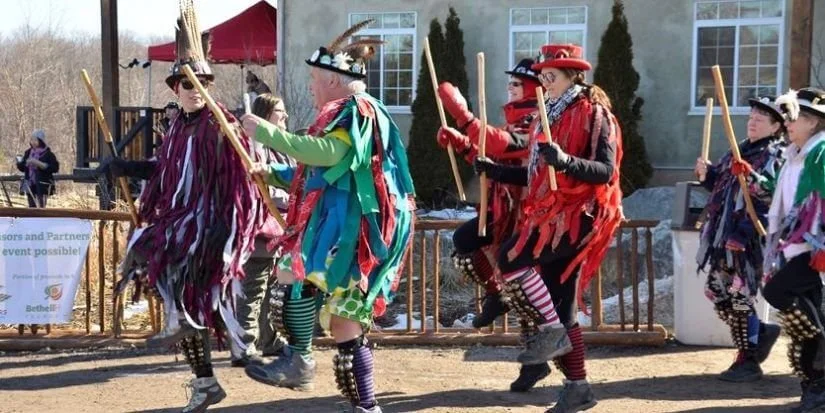Wassailing
Wassailing as a practice falls into two distinct categories.
a. The House-Visiting wassail, very much similar to caroling, is the practice of people going door-to-door singing Christmas carols. In modern times, it is most commonly known through reference in various traditional Christmas carols.
b. The Orchard-Visiting wassail refers to the practice of singing to trees in apple orchards in cider-producing regions of England to promote a good harvest for the coming year.
The Origins of Wassailing
Some scholars prefer a pre-Christian explanation of the old traditional ceremony of wassailing. How far the tradition dates back is unknown but it has undeniable connections with Anglo-Saxon pagan ritual. Of recent times the word Wassail (from the Anglo-Saxon toast wæs þu hæl, “be thou hale” — i.e., “be in good health”) has come to be synonymous with Christmas. The word wassail is old English (OE) and so may predate the Norman conquest in 1066. According to the Oxford English Dictionary “waes hael” is the Middle English spelling parallel to OE “wes hal”.[1] The American Heritage Dictionary, fourth edition, gives Old Norse “ves heill” as the source of Middle English “waeshaeil”.
The House-Visiting Wassail
Christmas was not celebrated anywhere before the third century, and only gradually moved northwards through Europe. Charlemagne was crowned on Christmas day 800. It was probably the Normans who brought the celebration to England. Trolley the Wassail is celebrated on Twelfth Night January 6. However most people insist on wassailing on ‘Old Twelvey Night’ (January 17) as that would have been the correct date before the introduction of the Gregorian Calendar in 1752.
The practice has its roots in the middle ages as a reciprocal exchange between the feudal lords and their peasants as a form of recipient initiated charitable giving, to be distinguished from begging. This point is made in the song “Here We Come A-Wassailing”, when the wassailers inform the lord of the house that “we are not daily beggars that beg from door to door but we are friendly neighbours whom you have seen before.”
The lord of the manor would give food and drink to the peasants in exchange for their blessing and goodwill, i.e…
“Love and joy come to you,
And to you your wassail too;
And God bless you and send you
a Happy New Year”
… which would be given in the form of the song being sung. Wassailing is the background practice against which a carol such as “We Wish You a Merry Christmas” can be made sense of.
Although wassailing is often described in innocuous and sometimes nostalgic terms, the practice has not always been considered so innocent. In fact in early New England wassailing was associated with rowdy bands of young men who would enter the homes of wealthy neighbors and demand free food and drink in a trick-or-treat fashion. If the householder refused, he was usually cursed, and occasionally his house was vandalized.
The example of the exchange is seen in their demand for “figgy pudding” and “good cheer”, i.e., the wassail beverage, without which the wassailers in the song will not leave, “we won’t go until we’ve got some.”
The Orchard-Visiting Wassail
In cider-producing areas of England, such as the West Country, wassailing also refers to drinking (and singing) the health of trees in the hopes that they might better thrive.
An old rhyme goes:
“Wassaile the trees, that they may beare / You many a Plum and many a Peare: / For more or lesse fruits they will bring, / As you do give them Wassailing.”
The purpose of wassailing is to awake the cider apple trees and to scare away evil spirits to ensure a good harvest of fruit in the Autumn.{“England In Particular”, Common Ground 2007} The ceremonies of each wassail varies from village to village but they generally all have the same core elements. A wassail King and Queen to lead the proceedings, and song and/or a processional tune to be played/sung from one orchard to the next, the wassail Queen will be lifted up into the boughs of the tree where she will place toast that has been soaked in Wassail from the Clayen Cup as a gift the tree spirits and to show them the fruits of what they created the previous year. Then an incantation is usually recited such as
Here’s to thee, old apple tree, That blooms well, bears well. Hats full, caps full, Three bushel bags full, An’ all under one tree. Hurrah! Hurrah!
Then the assembled crowd will sing and shout and bang drums and pots & pans and generally make a terrible racket until the gunsmen give a great final volley through the branches to make sure the work is done and then off to the next orchard. Perhaps unbeknown to the general public, this ancient English tradition is still very much thriving today. The West Country is the most famous and largest cider producing region of the country and some of the most important wassails are held annually in Carhampton (Somerset) and Whimple (Devon), both on 17 January (old Twelfth Night).
Private readings about people in Somerset in the 1800s revealed that inhabitants of Somerset practised the old Wassailing Ceremony, singing the following lyrics after drinking the cider until they were “merry and gay:”
“Apple tree, apple tree, we all come to wassail thee, Bear this year and next year to bloom and to blow, Hat fulls, cap fulls, three cornered sack fills, Hip, Hip, Hip, hurrah, Holler biys, holler hurrah.”
Listen to an authentic rendition of the Gloucestershire Wassail by The Longest Johns.





